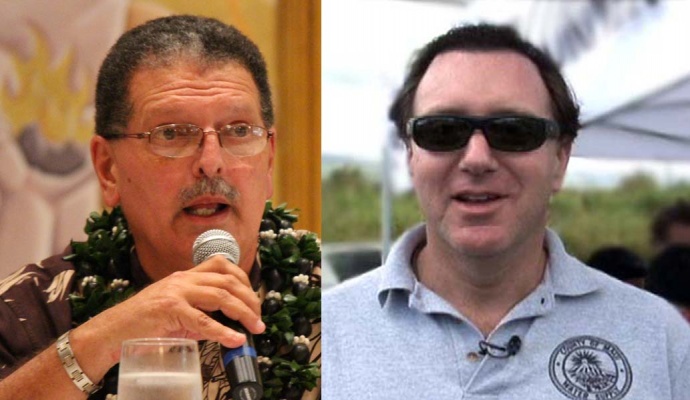Rate Control for Times of Water Shortage Passes First Reading

Michael Victorino, Committee on Water Resources Management Chair (left); and Dave Taylor, Maui Water Department director (right). File photos by Wendy Osher.
By Wendy Osher
Members of the council committee on water resources today passed a bill on first reading that seeks to establish special water rate actions and conservation measures during times of water shortages and drought.
A major sticking point was whether to include a 90 day exemption in the bill for agricultural consumers; or to establish a three stage water rate increase of up to 20% for agricultural consumers depending on water shortage conditions.
Ultimately, the committee voted 4 to 2 in favor of the 90 day exemption despite a recommendation against it by Water Director Dave Taylor who said the period is “just too long,” and the event could be over before the department has a chance to react. Many of the severe droughts lasted from 30-45 days during which mandatory cutbacks were implemented, according to county officials.
“The plan has to be within a realistic time frame of when we get notice to when we have to pull it off. Ninety days–I just have to say again if you’re going to put it in there, you might as well get rid of this (the bill). We will never know when we’re 90 days out. Never. It is just not a functional criteria,” said Taylor.
In the case of a mechanical outage, Taylor noted that emergency measures could require much faster response. “Even in Hāna where it rains all the time, there’s only two wells. If one of them goes down, we’re at 50% (production) tomorrow, and that could last for months… A mechanical outage on one of the small systems like Molokaʻi or Hāna could have major effects almost overnight, and there would be no warning for those either,” said Taylor.
Committee Chair Michael Victorino, who recommended the 90 day exemption was able to get it passed with the support of fellow members Robert Carroll, Stacy Crivello, and Don Guzman. Those voting against it included Don Couch and Gladys Baisa.
Victorino said the committee may come back at a later date to make changes, but said the 90 days is a starting point and gives agricultural consumers the ability to plan ahead and determine when to plant, cut back, harvest early, or send to slaughter.
Committee member Don Guzman who also supported the 90 day exemption said, “I think what the agricultural community is looking for is some type of reliability or guarantee that there’s language in here that they are going to be taken care of… There needs to be some type of language that would somewhat guarantee them some type of reliability, not just waiting for each fiscal year and us determining the rates.”
Taylor also recommended removing an exemption that states: any area affected by shortage, infrastructure or mechanical malfunction caused by human error shall be exempt from water shortage rate increases.
“What this says is that if there is an outage due to something that breaks, we’re not allowed to use the shortage rates. That’s a key reason of having the shortage rates,” said Taylor. “Between the 90 days and this exemption, there’s really no point in having this bill. Those are the two things likely to have an effect,” he said noting that the mechanical malfunctions can particularly affect the smaller rural areas of the county.
Councilmember Baisa said the higher rates during a shortage is a way to get people to use less water, and that exemptions are not going to help. “I don’t know if with all the give-mes that we’re giving if we’re going to accomplish the goal of this. If it’s down, it’s down, no matter what we charge, it’s not going to make the water come back.”
Victorino, who remained impartial on the matter (but voted yes for the sake of compromise) explained that the primary reason for the exemption was so that the public would not be penalized with a higher rate for a county mistake that caused the outage. However, he said, “I do agree with the aspect of the smaller systems. They’re the ones that are going to be most adversely affected.”
The item was removed in a 4 to 2 vote with Crivello and Guzman voting no; and Couch, Baisa, Carroll and Victornio voting in favor of removing the exemption.
Committee Chair Michael Victorino recommended that the revised proposed bill pass on first reading saying, “I don’t think this solves everything, but I think we got 80% done. Now we need to look for that other 10-20%.”








